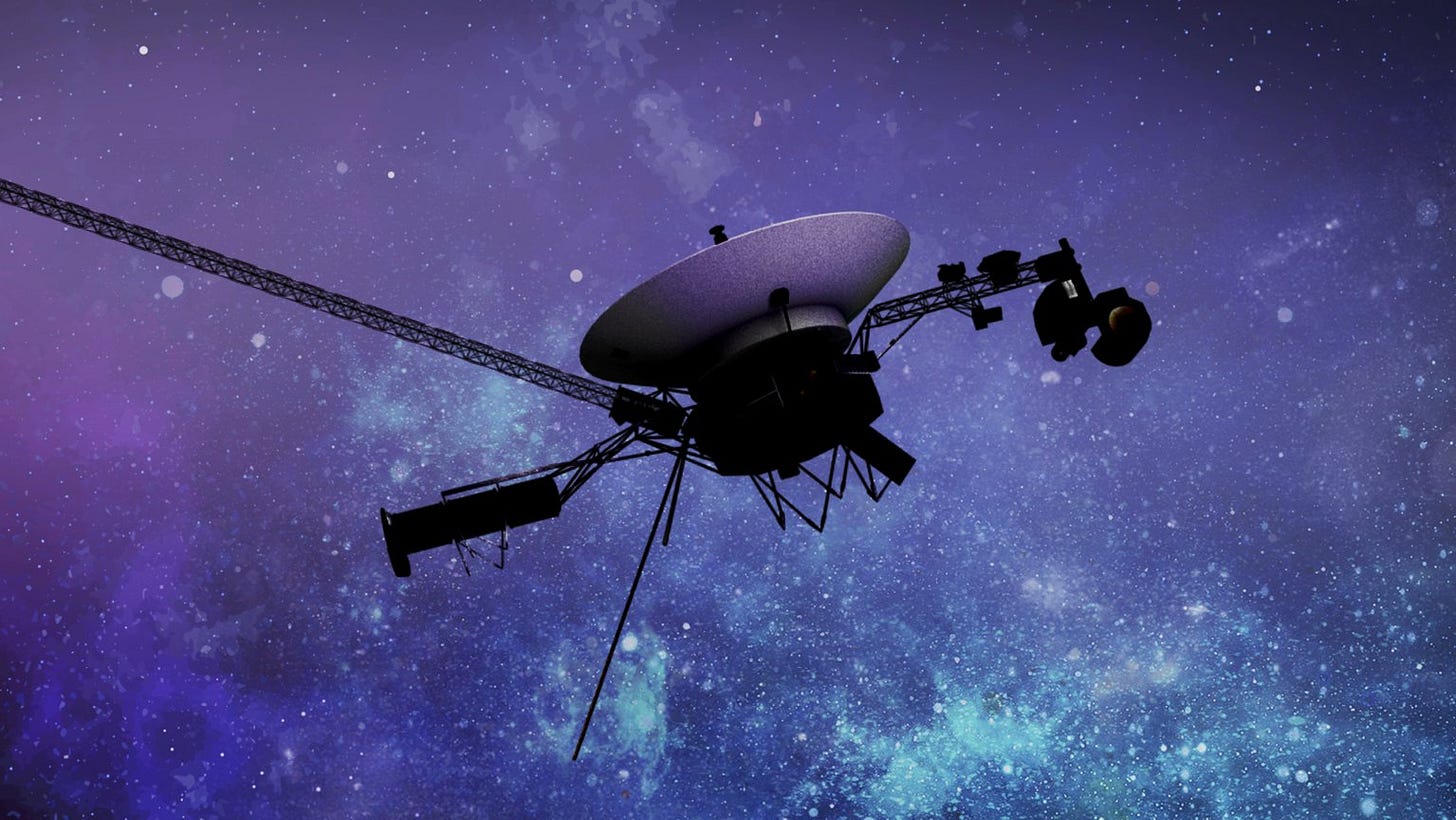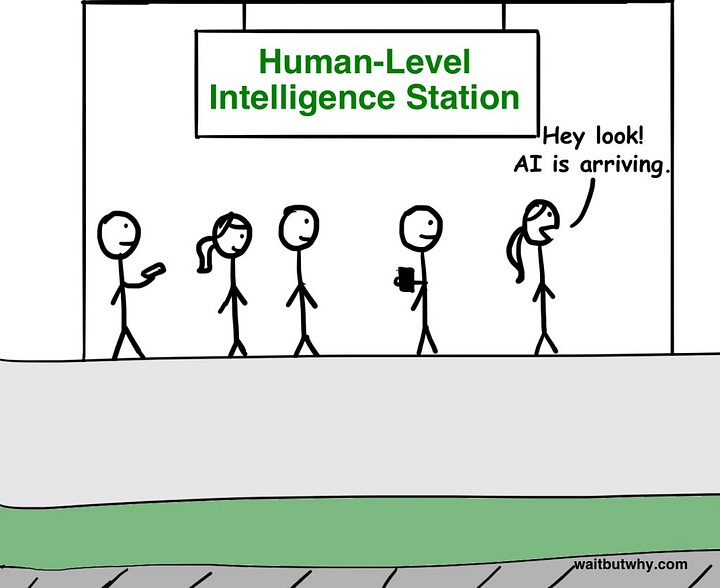Techno-Optimist #1
Embarking on an odyssey of discovery and progress
Welcome to the inaugural edition of Techno-Optimist, where we delve into stories from the frontiers of science, space, technology, medicine, energy, AI, and more. Join me as we explore the edge of human progress, fueled by relentless curiosity and the pursuit of innovation. This time we’ll look at some stories from the last month or so, plus an incredible celestial event happening next week.
In a previous chapter of my writing journey, I contributed to The White Pill, an excellent techno-optimist type newsletter from Pirate Wires. Circumstances have placed it on hiatus, at least for now, but the fire within me still burns. And so, this newsletter emerges, a beacon of hope and possibility, and a bulwark against stagnation and antihumanism.
Why Techno-Optimist? Because the world needs it. Our culture, particularly the cacophony of mainstream media, often peddles a narrative of fear and disparages true progress. But here we defy the naysayers, peeling away the blinders obscuring our view of a better future.
The mission is clear: to infuse your inbox with techno-optimism, and help inspire a sense of possibility within everyone who reads it. Whether you’re already building something incredible, or cheering from the sidelines, this space is for you.
So buckle up, fellow travelers. Let’s accelerate harder and faster, and chart a course towards a brighter, bolder tomorrow.
Alright, let’s dive in.
“Give us a real world problem, and we can invent technology that will solve it.”
—Marc Andreessen

Eclipse incoming! If you haven’t already heard: next Monday, April 8th, North America will be graced with a total solar eclipse, where the Moon passes directly between the Sun and Earth, perfectly blocking the main disc of the Sun from our point of view. During totality, the Sun’s outer atmosphere — called the corona — will be visible against the obsidian backdrop of space (as an added bonus, comet 12P/Pons-Brooks might be visible to the naked eye). I’ve heard it’s a magnificent sight to see in person; so if you can, get some eclipse glasses and take a road trip to where totality is visible across Mexico, the United States, or Canada. Even if you aren’t in the direct path, virtually the entire continent will see at least a partial eclipse. Remember that the last total solar eclipse in North America was 2017, but we’ll have to wait until 2044 for the next one. It’s never too early to mark your calendars! (NASA) (New York Times)

Starship’s 3rd flight. Thursday, March 14th saw the 3rd flight of SpaceX’s colossal Starship rocket, the biggest and most powerful ever built. The launch was a pretty definitive success in that it got further and hit more marks than the previous two—all 33 engines ignited, and the hot staging separation of the Super Heavy booster from the main Starship vehicle was seamless, with the booster making it close to splashdown in the Gulf of Mexico before kissing the water just a little too fast. Meanwhile, the upper vehicle, Starship, made it into space, and did a successful coast before burning up sometime during reentry into the atmosphere. The jaw dropping imagery—transmitted in high detail by Starlink satellites—showed incredible video of the atmosphere being turned to plasma around the vehicle during reentry. Though some in the media have characterized it as a failure, Starship’s 3rd flight epitomizes SpaceX’s philosophy of progress through rapid iteration and testing—ideally with each attempt getting farther and working better, which was the case here. “Starship”, Elon Musk said soon after the launch, “will take humanity to mars.” We echo his sentiment, Mars and beyond! Ad astra. (Ars Technica)
You can watch a replay of the entire flight here. The video of atmospheric reentry is particularly worth watching.

Stem cell breakthrough could help bring back woolly mammoths. Colossal Biosciences, a pioneering biotech company, firmly believes that ‘de-extinction’ is possible. Recently they achieved a breakthrough by “converting skin cells from Asian elephants (Elephas maximus) into stem cells capable of growing into the layered cells that become vertebrate tissues.” These induced pluripotent stem cells (iPSCs) will help in the next stage of testing, where the company will genetically engineer the cells to express woolly mammoth traits—e.g., long hair, subcutaneous fat, and smaller ears—and test them in the lab before actually creating mammoth embryos and implanting them into Asian elephants. The advance also promises to deepen our understanding of elephant biology, and could help in conservation efforts for modern elephant species. (@itiscolossal) (Science) (Singularity hub)
“If you think about the most important headline of the 20th century, unquestionably it was humans landing on the moon. In the 21st century, bringing an extinct species back to life would hold similar weight in the history of humanity. It is hard to imagine a more profound project than the de-extinction of species once considered lost forever.”
—Richard Garriott (2nd Generation Astronaut)

Neuralink’s groundbreaking moment: first patient goes public. Just a few days after Starship’s third flight, another technological marvel has emerged. Noland Arbaugh—the first recipient of a Neuralink implant, and paralyzed from the shoulders down—took center stage, giving a livestream demonstration on X, demonstrating his ability to control a computer and play computer games. “It was like using the force on a cursor, and I could get it to move wherever I wanted” he said, obviously pleased. The chip, nicknamed Telepathy according to Neuralink’s founder Elon Musk, is a bridge between man and machine that offers hope to those grappling with physical limitations. Arbaugh went on to make the first “post made just by thinking, using the [Neuralink] Telepathy device!” Though the device isn’t perfect, and it’s obviously early days still, Arbaugh declared that “it has already changed my life.” Perhaps equally exciting is an upcoming Neuralink product called Blindsight, with the implant already doing exactly what the name suggests in monkeys. (@elonmusk) (Interesting Engineering)
3D bioprinting takes a remarkable leap. In the realm of medical innovation, a dream has finally been realized, at least in rats: 3D bioprinting skin directly into injuries, a feat that once seemed confined to science fiction. Using a specialized “bio-ink”, researchers started by successfully printing the hypodermis – the crucial bottom layer of skin, composed of fat and connective tissue. “We printed directly into the injury site with the target of forming the hypodermis, which helps with wound healing, hair follicle generation, temperature regulation, and more.”
They were also able to print the next layer of skin, the dermis, which sits above the hypodermis. The epidermis, or topmost layer of skin, does not need to be printed but forms naturally within two weeks. Now, a caveat: This remarkable technology has yet to touch human skin. But the technology is “rapidly approaching maturity,” and could soon open the door to revolutionize wound care and surgery. (Interesting Engineering)
Space
After decades of talking about mining helium-3 from the Lunar regolith, someone is going to try it. Private company Interlune recently announced that it successfully raised $15 million to start developing the technology to do just that. Helium-3 isn’t found on Earth except in tiny amounts, but on the Moon it has accumulated over eons—deposited there by the Solar wind. Applications here on Earth include neutron detection, low temperature physics research, and fuel for future fusion power plants. The company is planning a demonstration mission for 2026 to measure the amount of helium-3 in the Moon’s regolith. (Ars Technica) (@DrPhiltill)

After reports that our most distant robotic explorer had stopped sending data for good, it appears that Voyager 1 is soldiering on! NASA continues to work on the problem, and their engineers have reportedly received communication from the probe in response to their electronic queries. (@coreyspowell) (NASA)
How will astronauts know what time it is when they return to the Moon? NASA has been directed to “develop a unified lunar time standard by the end of 2026.” The LTC (or Coordinated Lunar Time) will provide the precise timekeeping that space missions require. However, it’s going to be a challenging task because time on the Moon moves slightly faster (about 58.7 microseconds per Earth-day) due to its lower gravity. (Sky News)
Though the movement of the planets doesn’t influence your lives, it appears that the movement of Mars does impact Earth’s climate. Delving into ocean sediments from the last 65 million years has revealed a 2.4 million year cycle where the gravitational influence of Mars periodically shifts the orbit of our planet, causing a warmer climate and increasing deep ocean circulation every 2.4 million years. (Space.com) (Nature)
AI, Energy, Engineering, & Physics




AI is definitely becoming smarter. Though still not the ‘AGI’ (artificial general intelligence) we see in such entities as Jarvis in Ironman or Sonny in iRobot, but it’s quickly getting closer. A new ranking shows that some popularly available AIs are rapidly approaching human level intelligence in a more generalized way. The current leader, Claude-3, has achieved an equivalent IQ score of 101. When AGI finally arrive, it will be sudden, and will quickly surpass human intelligence. (@waitbutwhy)
Roscoe, a robodog from Boston Dynamics that worked with the Massachusetts State Police, is now a hero after being shot in the line of duty. It happened when the robodog (along with two others) was sent into a house where an armed man had barricaded himself inside. Roscoe found the man in the basement, and when it followed him up the stairs, he shot it. The incident highlights the usefulness of robots in police work, and in this situation may have saved officers from being involved in a gunfight. (Interesting Engineering) (NBC Boston)
Consumer electronic devices like computers, smartphones, and televisions actually contain some gold. The amounts are small, and until now it’s never been considered economic to recover. But a new idea uses whey protein from cheese production to make a spongelike material that successfully pulled gold ions from a solution of computer chips dissolved in acid. It was a fairly impressive amount, almost half a gram of 91% pure gold from just 20 computer motherboards. (Interesting Engineering)
Results from tests done on “high” temperature superconducting magnets by Commonwealth Fusion Systems, a spinoff from MIT, have passed peer review. The verdict: success in achieving a 20 tesla field. “That's the intensity needed to build a fusion power plant that is expected to produce a net output of power and potentially usher in an era of virtually limitless power production.” Bring it on! (Science Daily)
Medicine
Last month, surgeons made medical history by transplanting a genetically modified pig kidney into a living human, Rick Slayman, who was suffering from kidney failure. They hope that he is the first of many to benefit from these modified pig kidneys. To “humanize” the kidney and remove harmful pig genes, 69 genetic edits were first made, as well as inactivating several viruses common in pigs. The procedure went smoothly, and the hope is that the kidney will keep Slayman healthy for several years. As of now, a monkey has been living healthily for two years with a modified kidney from the same company. (MedicalXpress)
In a recent study published in Nature, scientists used an antibody to target “a subpopulation of stem cells that eventually develops into the immune cells underlying chronic inflammation. The antibodies latched onto targets and rallied other immune cells to wipe them out.” This approach enabled them to revert the immune systems of elderly mice “back to a youthful state” with just a single treatment. Although it’s a small step, the pieces are gradually coming together to extend healthy human life. (Singularity Hub)
A breakthrough in wound healing has been made that could significantly impact global health. They discovered that a neuropeptide, calcitonin gene-related peptide (CGRP), can accelerate wound healing when injected into the body—with up to 2.5 times faster wound closure, and 1.6 times more muscle regeneration. (Science Daily)
Weakened Zika viruses have been found to effectively kill brain tumor cells in glioblastoma multiforme—the most common malignant brain cancer worldwide—while sparing healthy brain cells. Used alone or in combination with existing therapies, this could open a door to far more effective treatments for brain cancer. (SciTechDaily)
A new study has found that medicine delivered into the amniotic fluid in utero is just as effective as delivering it into the cerebrospinal fluid of a developing fetus that needs treatment for a serious medical condition. This finding should greatly reduce the dangers of administering such treatments, improving outcomes for both mother and child. (Science Daily)
Taking common fiber supplements has been linked to improvements on cognitive tests in older adults, strengthening the growing body of knowledge that suggests a connection between gut and brain health. Positive changes were noticeable after just three months. Although studies on food and health are common and often contradictory, this seems straightforward to try and really has no downsides. So eat your fiber! (Science Alert)
Biotech & Agriculture
When introducing new DNA to bacteria in a lab, scientists typically use a method called heat shock. This process involves exposing the bacteria to high heat for a short period, which opens up their cell walls and allows plasmids containing the desired DNA to enter. However, this method is only about 77% effective. A collaborative effort between an Australian university and a US biotech company has led to the development of a more effective method: using high-frequency radio waves to achieve the same result, but with an effectiveness of 91%. The ability to quickly and accurately genetically modify bacteria is crucial, as they serve important roles ranging from laboratory subjects to producing insulin and other essential drugs and chemicals. (Interesting Engineering)
Artificial DNA is making progress, with researchers from the Breakthrough in Nucleic Acid Research’s Department of Chemistry developing a new type of nucleic acid known as threofuranosyl nucleic acid (TNA). The structure of TNA differs from naturally occurring nucleic acids like DNA and RNA, making it more stable and resistant to the cell’s degradation enzymes.
[Aside: the natural sugar forming the backbone of DNA was replaced by a slightly different one containing four carbons instead of five, and two artificial bases were added, bringing the total up from four to six]. Potential applications include drug delivery, diagnostics, and better control of cellular mechanisms for disease treatment. (SciTechDaily)
Weird & Wonderful
A real ‘Ironman’ race was recently held in Dubai, where the participants all wore jet suits and flew an overwater rout laid out with buoyant markers. Yes, you read that right—it was a jet suit race. The word’s first but definitely not last! (Interesting Engineering)
Living in the streams of Myanmar is a tiny fish called Danionella cerebrum. Despite being only about the size of an adult human’s fingernail, it can emit sounds at 140 decibels – as loud as a gunshot. High-speed video recordings have revealed how the little creatures achieve this. They drum on their swim bladders using a “drumming cartilage, a specialized rib, and a fatigue-resistant muscle.” Only the males can produce sounds at these volumes, and they have a much harder “drumming rib” for this purpose. (Interesting Engineering)

It has been hypothesized that one of the reasons zebras have stripes is to ward off biting and bloodsucking insects. Indeed, they are attacked less than their stripeless mammalian compatriots. Farmers in Japan have decided to try copying this strategy by painting their (black) cows with white stripes in a bid to keep these insects away. It seems to be working, “with painted cattle showing lesser signs of stress than their unpainted counterparts.” (Interesting Engineering)
Photos & Videos
With the solar eclipse coming soon, let me show you some eclipses from angles few have seen.


The Event Horizon Telescope team has captures evidence of “strong magnetic fields spiraling at the edge of Milky Way’s central black hole, Sagittarius A*.” These magnetic lines were also observed around M87*, the first supermassive black hole ever photographed, suggesting that all black holes—or at the very least all supermassive ones—might have strong magnetic fields. (Event Horizon Telescope) (@ehtelescope)

Recommendations & Reviews
This is where I’ll typically spotlight interesting books and films related to science, space, and technology, along with intriguing essays, etc. However, this week, I’d like to divert your attention to some noteworthy Substacks that are well worth your time and subscription. If you’ve enjoyed this first edition of the Techno-Optimist, these recommendations will likely resonate with you as well: Not Boring by Packy McCormick Faster, Please! Planetocracy
That’s all for now, but I’ll be back with more Techno-Optimist soon. The current plan is a new edition every fortnight, but as soon as it gathers 1,000 free subscribers or 40 paid subscriptions (whichever comes first), I’ll switch to a weekly cadence. So, dear reader, please subscribe and share.
Thank you for reading — and until next time, keep your eyes on the horizon.
-Owen




Congratulations, Owen. This is a really excellent survey. My hope is that rather than just offering your readers a survey of important scientific findings that you will also serve up some detailed, longer essays on particularly intriguing scientific topics.
I’ll even offer up a topic that readers might find fascinating. In your debut post you mentioned the idea of using viruses as therapeutic agents to treat glioblastoma. The benefit of this approach is that the genetically engineered viruses (especially viruses that target neurological tissue) can directly destroy cancer cells while at the same time serving as delivery vehicles for cancer-fighting compounds. The virus becomes both a treatment and a vector that delivers medicines directly to the tumor site in a highly specific way.
One reason that glioblastoma multiforme is almost impossible to successfully treat is that even after the brain tumor is successfully resected, cancer stem cells (that are impossible to see) remain in the brain. Chemotherapy has been completely ineffective at killing these stem cells. That’s why gliomas almost always recur.
The magnificent thing about the oncolytic viruses in clinical trials is that they have demonstrated an ability (at least preliminarily) to kill both brain cancer cells as well as the stem cells that cause recurrence. It’s all very promising.
Several biotech firms are working on a variety of different types of oncolytic viruses which may someday offer much better treatment options for patients with glioblastoma multiforme.
There is another experimental treatment that shows some promise in treating what is an otherwise intractable brain cancer. The ketogenic diet is an ultra low carbohydrate diet (less than 20 grams of carbohydrates per day) that has become a standard treatment for drug-resistant epilepsy. It’s mechanism of action (without going into too much detail) is converting the respiration of brain cells from oxidative phosphorylation to glycolysis.
There is reasonably good preliminary evidence that healthy neurological tissue works just fine when using glycolysis but cancerous glial cells don’t; they need to rely on oxidative phosphorylation to thrive. A diet that prevents brain cancer cells from respirating properly weakens them and makes them more vulnerable to treatment.
Getting back to oncolytic viruses; various viruses are being explored as treatments for many different types of solid tumors, not just brain cancer.
Glad to see something like the white pill coming back to Substack! I was so sad when the white pill left Substack. I hope techno-optimist will stick.